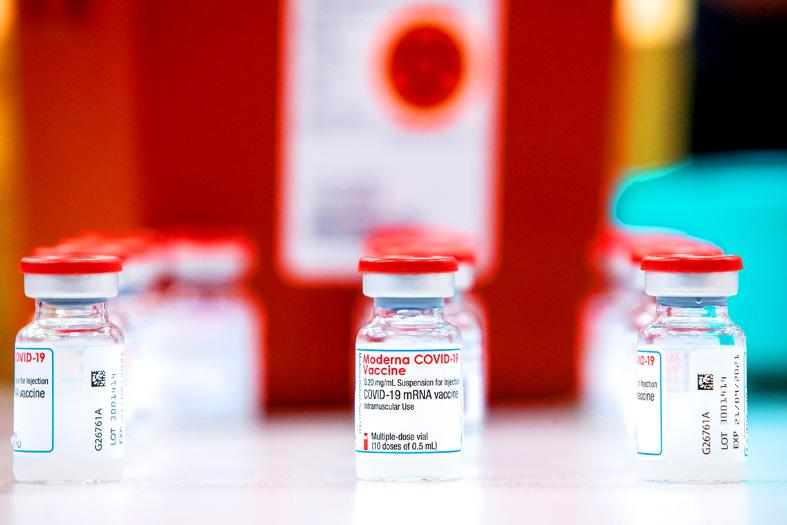Shipments of Moderna COVID-19 vaccines are due to arrive in Taiwan next month, while another batch of AstraZeneca vaccines allotted to Taiwan under the COVAX program is due to arrive by June, the Central Epidemic Command Center (CECC) said yesterday.
The Chinese-language Apple Daily reported that the Moderna vaccines might arrive at the end of this month or next month.
The center in February said that Moderna had agreed to supply about 5 million doses to Taiwan, although at the time the center estimated that they would arrive in the middle of this year.

Photo: Reuters
Centers for Disease Control Deputy Director-General Chuang Jen-hsiang (莊人祥), who is the CECC’s spokesman, said that 9,470 additional AstraZeneca shots had been sent to 68 medical facilities to expedite the rollout.
The CECC would also provide shots to local health departments, Chuang said, amid reports that vaccinations are lagging due to wariness among the public.
The Apple Daily quoted National Taiwan University Children’s Hospital pediatrician Huang Li-min (黃立民) as saying that low administration rates of the AstraZeneca vaccine was due to safety doubts, not people failing to heed CECC recommendations to get the jab.
The AstraZeneca vaccine has been linked to unusual blood clots, resulting in reluctance to get the shots, Huang said, adding that the Moderna vaccines should not draw the same skepticism.
The CECC is moving forward with the vaccine rollout, Chuang said.
The Food and Drug Administration has been asked to contact the manufacturers of the vaccines and inquire about extending their shelf life.
Two shipments of AstraZeneca vaccines expire on May 31 and June 15.
Regulations say that the manufacturer must conduct a stability test before an application to extend a shelf life can be submitted, Chuang said.
In the worst case, the expiration date would be unalterable and the vaccines disposed of, he said.
Asked about Denmark’s decision to stop its rollout of AstraZeneca vaccines completely, Chuang said that nations have their own considerations and standards, citing decisions in the US and Australia to halt inoculations with the Johnson & Johnson vaccine, while France is pushing forward with that product.
Including 1,319 people given the the AstraZeneca vaccine on Wednesday, Taiwan has inoculated 28,465 people, Chuang said.
Twelve cases of an adverse event following immunization were reported on Wednesday, but the cases were not severe, he said.
The CECC yesterday announced one additional confirmed case of imported COVID-19, designated case No. 1,069.
A Taiwanese aged under five who had been living in Indonesia arrived in Taiwan on March 28 with case No. 1,036, the CECC said.

The US government has signed defense cooperation agreements with Japan and the Philippines to boost the deterrence capabilities of countries in the first island chain, a report by the National Security Bureau (NSB) showed. The main countries on the first island chain include the two nations and Taiwan. The bureau is to present the report at a meeting of the legislature’s Foreign Affairs and National Defense Committee tomorrow. The US military has deployed Typhon missile systems to Japan’s Yamaguchi Prefecture and Zambales province in the Philippines during their joint military exercises. It has also installed NMESIS anti-ship systems in Japan’s Okinawa

TRAGEDY STRIKES TAIPEI: The suspect died after falling off a building after he threw smoke grenades into Taipei Main Station and went on a killing spree in Zhongshan A 27-year-old suspect allegedly threw smoke grenades in Taipei Main Station and then proceeded to Zhongshan MRT Station in a random killing spree that resulted in the death of the suspect and two other civilians, and seven injured, including one in critical condition, as of press time last night. The suspect, identified as a man surnamed Chang Wen (張文), allegedly began the attack at Taipei Main Station, the Taipei Fire Department said, adding that it received a report at 5:24pm that smoke grenades had been thrown in the station. One man in his 50s was rushed to hospital after a cardiac arrest

‘WIN-WIN’: The Philippines, and central and eastern European countries are important potential drone cooperation partners, Minister of Foreign Affairs Lin Chia-lung said Minister of Foreign Affairs Lin Chia-lung (林佳龍) in an interview published yesterday confirmed that there are joint ventures between Taiwan and Poland in the drone industry. Lin made the remark in an exclusive interview with the Chinese-language Liberty Times (the Taipei Times’ sister paper). The government-backed Taiwan Excellence Drone International Business Opportunities Alliance and the Polish Chamber of Unmanned Systems on Wednesday last week signed a memorandum of understanding in Poland to develop a “non-China” supply chain for drones and work together on key technologies. Asked if Taiwan prioritized Poland among central and eastern European countries in drone collaboration, Lin

ON ALERT: Taiwan’s partners would issue warnings if China attempted to use Interpol to target Taiwanese, and the global body has mechanisms to prevent it, an official said China has stationed two to four people specializing in Taiwan affairs at its embassies in several democratic countries to monitor and harass Taiwanese, actions that the host nations would not tolerate, National Security Bureau (NSB) Director-General Tsai Ming-yen (蔡明彥) said yesterday. Tsai made the comments at a meeting of the legislature’s Foreign Affairs and National Defense Committee, which asked him and Minister of National Defense Wellington Koo (顧立雄) to report on potential conflicts in the Taiwan Strait and military preparedness. Democratic Progressive Party (DPP) Legislator Michelle Lin (林楚茵) expressed concern that Beijing has posted personnel from China’s Taiwan Affairs Office to its